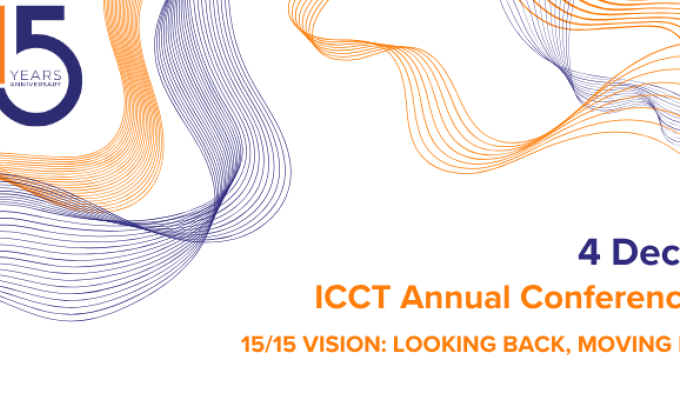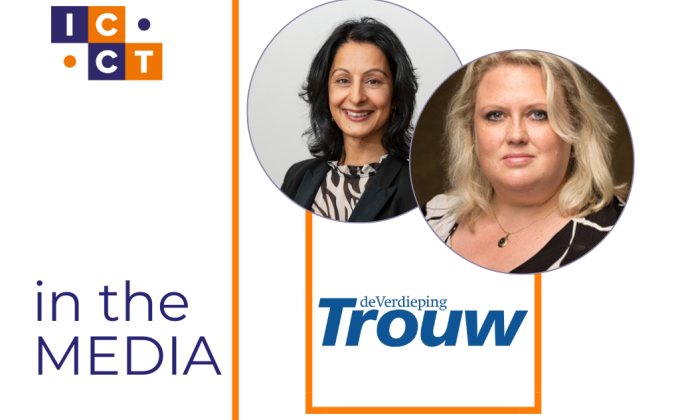Counter-Terrorism After 9/11 is a podcast series exploring how counter-terrorism has changed in the aftermath of the terrorist attacks on September 11th, 2001.
In our sixth episode, we speak to Hani Shamsi, Director of the American Civil Liberties Union's (ACLU) National Security Project.
This interview examines how civil liberties and human rights fit into the framework of national security, their intersections with counter-terrorism, as well as providing insight into how these elements have changed over the past twenty years. Interviewing her is Dr. Rumyana van Ark, a Research Fellow and Coordinator at the International Centre for Counter-Terrorism.
You can listen to Counter-Terrorism After 9/11 using the audio player below or through your favourite podcast player (Spotify, Apple, Google, Breaker, Pocket Casts, RadioPublic). Below is a transcript of the interview, which has been shortened and adapted for publication.
Warning: This transcript/podcast contains material that some viewers may find distressing.

Hina Shamsi
RUMYANA VAN ARK: It is a pleasure to be joined today by Hina Shamsi, the Director of the ACLU National Security Project. Hina, our listeners and readers will undoubtedly be very familiar with your name and your work but could you briefly introduce yourself, your role within ACLU and perhaps a little bit about your professional background?
HINA SHAMSI: Of course, first of all, let me begin by thanking you so much for having me. It's my great pleasure. My name is Hina Shamsi and I am the Director of the ACLU's National Security Project. My colleagues and I seek to ensure that US national security policies and practices abide by the Constitution, human rights, and the United States’ obligations under law, which, as you can imagine, has been something of a challenge over the last twenty years.
VAN ARK: Thank you very much. I would like to start a little bit before 9/11. The 20th anniversary of 9/11 in parallel with the heart-breaking scenes and events in Afghanistan has triggered many reflections on the day itself and on the legacies and aftermath of the day. Before we delve into this post-9/11 world of security and counter-terrorism, I would like to ask you for your thoughts on the pre-9/11 trajectories of national security, of counter-terrorism, of human rights and civil liberties.
SHAMSI: Of course, and maybe I can start with [saying that] this is not ever an area on which I thought I would work, as a young person growing up. I grew up outside of the United States in Hong Kong and different parts of southern Africa, and originally from Pakistan, South Asia. I always wanted a career in human rights, but I thought it would be based on gender or refugee issues [and in] the parts of the world that I had grown up in.
I knew that the US had never been perfect on human rights issues, far from it. Often the US had supported regimes that were carrying out human rights violations, or certainly was plagued by its own domestic issues, so many of which are the consequence of enslavement. What the country did to indigenous populations, it has never fully addressed those issues properly. But the US said the right things on the world stage, even if it wasn't always doing the right things. There are very few countries, in fact, not any that, I would say, is absolutely perfect. And so, for me, growing up, it was how do we work towards equality, dignity, and justice for people in our various different communities as part of a global community. [I was] very impacted by my study of and commitment to the human rights regime, and how it developed in the post-World War II era.
And so fast forward to the era right before 9/11. In the United States, we go through paroxysms, I think, of responses and overreactions to real and perceived threats. This country has a history of suppressing human rights and civil liberties, including domestically, only to come to regret it. And that period before 9/11 seems to be one of a focus on what was happening abroad - there [had] been the war in Iraq in an earlier period, but the attention also seemed to be a lot more inward. And a lot of the excesses of the Vietnam War, and that’s an euphemism [for the] rights violations of the Vietnam War era, [in] Cambodia, [within the] civil rights era had to some extent, at least been attempted to be corrected in law, infrastructure and policy. And there were movements, domestically, towards equality. The summer before 9/11, Congress was poised to pass the End Racial Profiling Act, banning bias based discrimination in law enforcement. So the trajectory seemed to be by no means perfect, [there were] significant problems, but not what we then came to see in the [post-]9/11 era.
VAN ARK: Indeed, it seems to be a Rubicon that we've crossed without coming back. And for many, the events of that day are very vivid and very distinctive memories still. For many, it prompted a really big change in personal and career path. We have already heard from other participants in the podcast series that it's linked to some very, very personal experiences on the day too. What is your most vivid memory of the day and has that driven you forward in your work, twenty years on?
SHAMSI: I have memories of the day that are indelible, and memories that are just part of what came in the emotion of the immediate aftermath. I was a young lawyer and my office building was opposite the World Trade Centre. I'm not going to get into this, but just it was shock, it was horror, it was deep concern for colleagues going through the subway.
Just a lot of shared trauma on the streets, and then a lot of acts of resilience and heroism that you could see around you. I remember people lining up to give blood, until we found out that there was no blood that was really needed. Just such a desire to mark what had happened. And for me also, especially in the immediate aftermath, as a brown Muslim woman, and an immigrant to this country, a fear of what the reaction would be, because I am a student of American history as well.
I remember a sense of relief, filled also with great trepidation, when a few days after the attack, President Bush went to an Islamic centre and said that the foundations of this country couldn't be shaken, and only the people who were responsible were actually responsible.
Where my career went after has everything to do with what was actually happening, which is that, even as President Bush was saying those things, a response was being put in place and planned that very soon after that resulted in a policy of state sanctioned torture, primarily carried out against brown, black and Muslim men led to Guantanamo, black sites, but also just domestically targeting of people for surveillance, suspicion, deportation, based on religion and national origin.
That caused devastating harm to this country and especially people of colour in this country and Muslims, but the same or similar approaches [caused] devastating harm abroad. And that, for me, but also for so many of my colleagues, both at the ACLU and the human rights community, has come to define our work and our generation.
Hina Shamsi argues against the motion, "The president has constitutional power to target and kill U.S. citizens abroad." Photo: Samuel LaHoz/Intelligence Squared U.S.
VAN ARK: There's quite a few important themes to touch on a little bit more. But I want to start with the note that you ended on. Post-9/11, it is almost a misnomer to reflect on national security, when counter-terrorism policies and measures have such a transnational impact and continue to have this transnational impact. What are your thoughts on this transformation?
In particular on this intertwining that you've implied between immigration measures and counter-terrorism measures, national security measures, criminal justice measures. In many respects, the border has really become a defining feature and immigration policies have come to define this new phase of counter-terrorism post-9/11.
SHAMSI: At the very real risk of oversimplifying, I want to sort of pull out a theme that is embedded in your question. In the name of national security, the response of the last twenty years has largely been marked by this approach in which the US claims adherence to human rights and universal values and domestic values even as, in the name of national security, it has violated human rights. When we're talking about immigration and the border, a lot of those things are embedded in fundamental human rights.
The right to refuge asylum, the right against discrimination on the basis of race, religion, national origin, and the right to due process [and] equality. If your liberty or other fundamental human rights are to be deprived, they cannot be deprived without due process of law. And in area after area, the constraints and safeguards that the human rights system put in place and sought to put in place and that in many ways are supposed to be mapped on to or consonant with the US Constitution, those were cast aside or violated.
That's part of a trajectory that we saw continuing through the Bush Administration, obviously. [And] in many, many ways through the Obama Administration. And then through the Trump Administration, the veneer of norms and safe policy safeguards and constraints that had been put on [excessive executive] authority was cast aside.
To give just one example, I remember how heartened I was after Trump imposed the Muslim ban, to see people streaming to the airports and saying, of Muslims, let them in. That's something I did not think I would expect to see in my lifetime. But even then, it reminded me of the original Muslim registry in the post-9/11 era under George W. Bush, which required special registration of primarily young Muslim boys and men and immigrants and visitors and the tearing apart of families. And then later on, our Supreme Court, after multiple legal fights, upheld a very pernicious version of the Muslim ban. So to go back to your question, in the name of national security, a lot of these harms and devastations and violations of law and displacement [of the] rule of law [were justified on a necessary balance between security and individual liberties].
I really hate the term Global War on Terror, War on Terror, it's very much the Bush Administration's frame. But part of what continues with that rhetoric is a claim that in the name of what must and should be understood as exceptional, which is war. The US can claim war based authority, states of emergency, in order to engage in actions that are outside of war and are grounded in militarisation, violence and racial injustices.
VAN ARK: This balancing exercise between human rights and security has been used as a justification a lot, when in reality, the balance is not really a balance, and it's very much shifting the scales deliberately in one direction and pretending respect for the other side. How do you feel that human rights civil liberties have resisted this push, this balancing exercise if we're to call it that. Do we think that they have resisted enough? Is there a lot of work still to be done?
SHAMSI: Like you, I tend to resist the notion of balance. This idea that on the scales, if one thing goes up, the other thing has to go down. And that's positing an opposition between rights and security, where I think rights and security have got to go hand in hand. And that's not just words, it is in action. Which means if you impose, for example, security measures abroad, or lethal strikes in fragile, conflict-ridden states, instead of the necessary work of showing a respect for human rights in communities where states are fragile, human rights defenders are working so hard to advance communities interests, looking for a multi-pronged approach. The balance of the last twenty years has always tilted. It's actually got to go hand in hand instead.
There's a lot of work that's been done and a lot of work I think that needs to be done, because in many ways, I had not anticipated quite how far the United States would go, twenty years later. I think thanks to the work of impacted communities, of independent media, of rights advocates and allies, some of the worst abuses have come to light and ended.
[The clandestine Black Sites/High Value Detainees] torture program, it took a while to end it, but by the end of the Bush Administration, we had ended it. [However], torture is always like a cancer or a corruption. It permeates systems. Torture is currently still permeating the failure to end indefinite detention and unfair trials at Guantanamo.
The special registration of Muslims lasted ten years, in one form or another. When it was clear that the Trump Administration was on the horizon, thanks to the work of rights advocates and impacted communities, the Obama Administration took the legal and policy infrastructure that still remained on the books, off the books.
Another thing that we've worked on is the [NSA’s] mass surveillance and collection of virtually every American's call records, that's also ended. So when we work together through highlighting the issues, bringing them to light, court cases combined with advocacy for oversight, abroad and domestically, we're able to bring those things to an end.
It is so necessary to keep going. And in order to keep going, I have to have hope. And so I find hope when I look around and see actions, such as the racial justice protests last summer here in the United States. Those were due to the years long work of black organisers. And communities then coming out in response to the tipping point of the horrific tragedy of the killings of George Floyd, Breonna Taylor, and far too many other black men and women.
That led to a movement on the streets in the United States, but also the rest of the world, which I was so heartened to see was drawing the connections between militarization at home and militarization abroad. The connections between seeing communities of colour as a security threat at home to what that means abroad. Those connections are there, whether we talk about prevention approaches, countering violent extremism programmes, both here in the United States and similar programmes abroad, that tear apart communities.
For me, it is about the resilience and perseverance of young people who are saying no, no more, not in our name, we want change. And then the specific means and measures to take down this policy infrastructure that still remains in place in order to move towards what resilience and a commitment to fairness and justice and human rights can bring to us.
Photo: Democracy Now!
VAN ARK: With the scenes in Afghanistan really fresh in everyone's mind, it's really important to talk about hope. And before we talk a little bit more about hope, and what positive lessons [have been] learned, what are the biggest challenges that still remain in relation to counter-terrorism twenty years on?
SHAMSI: So in terms of challenges, I'm going to pick up where you left off with Afghanistan. We're talking about hope, and it's necessary. Afghanistan, to me, is about the resilience and efforts of Afghan people, and Afghan women and Afghan human rights defenders and leaders who have been at the forefront of the work for their own communities, and for whom so much more needs to be done shoulder to shoulder with them. It's hard for me and I wouldn't presume to tell people in very different situations about how they should have hope, as opposed to wanting to learn from them about what they would want.
One aspect I work on is the impact of US lethal strikes. I looked at the tremendous work that has been done by the Afghan Human Rights Commission and other leaders in Afghanistan. Part of the reason that they are where they are today is because the US was carrying out lethal strikes in the context of recognised war there. That had a devastating impact on civilians, with impunity, without meaningful accountability. And that's part of the legacy that my country has left.
Now we are hearing talk of so-called 'over the horizon' strikes, even in the wake of the terrible, terrible, wrongful strike in Afghanistan in Kabul on August 29th. And to me, 'over the horizon' is like using enhanced interrogation to talk about torture. If those kinds of strikes continue, it is a continuation of a programme of lethal strikes outside of recognised armed conflict.
The US is saying that it is withdrawing from Afghanistan, so that's presumably where we should be heading. But this is a programme that has devastated communities in multiple parts of the world from Pakistan, Yemen, Somalia, to name just a few. So that is one of the things that I think we absolutely have got to end. It fuels displacement and instability. It is a tactic, not a strategy. This country has put its own national security and those of its putative allies above those communities in which it acts. So that's one area that I think we really need to do work.
Another is, we really have to end indefinite detention unfair trials at Guantanamo. That may have not been at the forefront of many people's minds, but it remains that the United States is continuing to detain thirty-nine people there, and subject them to human rights abuses in that context. You can't put the post-9/11 era behind you without putting an end to that.
Another thing that is fuelling so many harms is that in 2014/2015, under the Obama Administration, our Department of Justice and Homeland Security, passed what's called 'guidance on race'. And it purported to ban bias based racial profiling on the basis of race, religion, national origin, but carved out gaping loopholes for national security and the border. In essence permitting that bias and that as a matter of structure and policy has then infused watchlisting systems, state and local and border practices. That's one of the things that have got to end in order to be able to start addressing the structural issues of racial injustice.
And then another thing that we're very focused on is reining in mass surveillance and putting an end to privacy violating policies and practices, both domestically and abroad. So many of these things go to the fundamental architecture that has been left in place that we want to work to dismantle.
VAN ARK: Indeed, I think it's very alluring, twenty years on, to try to think twenty years have passed. A lot of legislation has come, gone, been dismantled or changed. 9/11 doesn't feel as raw and as present as it used to be. But the reality is that we really have not moved away from it as much as we would like to hope and as much as you would like to think. There's still quite a lot that remains to be done. What is the biggest lesson that we have learned from 9/11and where do we go forward in terms of thinking about it for the next twenty years?
SHAMSI: You're asking an excellent question and a hard one because there are so many. It has really been a year of reflection. I did not know how bad it would be and how long it would take to dismantle it. But for me, the biggest lesson has been to, even as we work together on the different pieces that we may individually work on, a recognition of how our fates are intrinsically tied to each other. And that the response has to be seen and understood as being one that feeds on fear mongering approaches in an era of rising authoritarianism and populism.
We must continue to insist on equality and dignity and fundamental rights for ourselves and each other. That may just sound very naive, but it really keeps bringing me back to fundamentals when I feel like I'm getting too tied up in the legalese or the policy arguments. It really is a [question of] how do we work on this together? How do we advance a more just, rights-promoting future? And that's what I keep coming back to.
VAN ARK: I think that this is a wonderful food for thought, pause for reflection, and a big challenge for the next twenty years. How do we come back to this? And how does human dignity resist what we could call security populism? I would really like to thank Hina on behalf of our readers and our listeners, for having the time for us today and for sharing her thoughts and reflections on the last twenty years. It has been an absolute pleasure to have you with us. And hopefully we'll continue these conversations and this work in the future.
SHAMSI: Thank you so much for having me again.
Hina Shamsi is the Director of the ACLU's National Security Project.
Rumyana van Ark is a Research Fellow and a Coordinator at the International Centre for Counter-Terrorism. She is also a Post-Doctoral Researcher in Terrorism, Counter-Terrorism, and International Law at the T.M.C. Asser Institute.
Photocredit: ICCT/Canva








